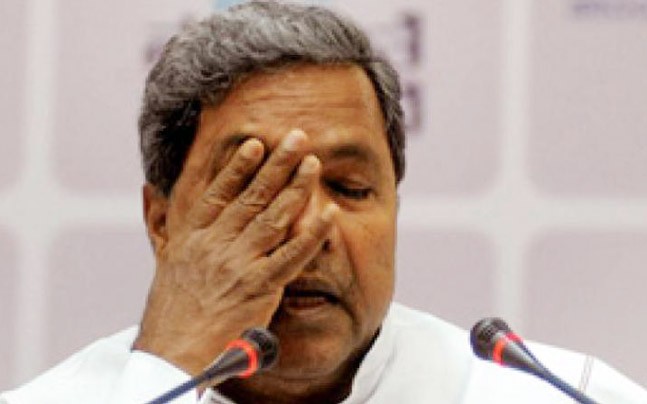The Congress seems to be getting quite nervous in the run up to the Karnataka assembly elections. It seems nothing is working for them. Siddaramaiah’s fake populist schemes have stood expose and pseudo-secularism with Tipu Sultan’s birth anniversary celebrations have only further disillusioned the electorate, especially the Hindu populace. In a major setback, the Lingayat issue seems to be backfiring badly for the Congress with a Lingayat seer joining hands with the BJP and publicly condemning the divisive move made by the Siddaramaiah government. Faced with massive infighting within the Congress and disillusionment of state leaders and cadres towards the top leadership, it is clear that Chief Minister Siddaramaiah has anticipated tough times ahead. Therefore, he has now come out with an obnoxious tweet that attempts to stir up the North-South divide. A leader who had not bothered to promote the state’s culture is suddenly intrigued by Pulakeshi II as a South Indian hero when elections are around the corner.
In his latest tweet, CM Siddaramaiah paid a politically colored tribute to Pulakeshi II even as Siddaramaiah is set to contest from Badami (The region was Pulakeshi’s kingdom). His tweet was more of an avoidable dig at North Indians rather than a humble tribute to Pulakeshi II. CM Siddaramaiah stated that even as he placed himself in the hands of people of Badami he seeks the blessing of Pulakeshi II. Instead of remembering the great ruler for his benevolence, Siddaramaiah chose to constrict Pulakeshi’s significance and remember him as the one who defeated the “powerful north Indian king Harshavardhana.” Chief Minister Siddaramaiah seems to remember even this bit about Pulakeshi II only because it helps him in venting his feelings of North-South differences. This is a desperate attempt by Siddaramaiah to garner votes by harming national unity.
As I place myself in the hands of the people of #Badami I remember how Pulakeshi II defeated the powerful North Indian King Harshavardana on the banks of Narmada.
I seek your blessings for building a Nava Karnataka #CongressMathomme
— Siddaramaiah (@siddaramaiah) April 24, 2018
However, this is not for the first time that Siddaramaiah has engaged in such condemnable and divisive politics. He had even concocted a theory that the 14th Finance Commission discriminated against the southern states. While the facts showed that there was in fact a rise in the share of South Indian states. It seems that having failed to woo the voters by all his divisive tactics and populist schemes, Siddaramaiah is finally resorting to baseless barbs at North Indians.
CM Siddaramaiah has finally seemed to realise that Tipu Sultan was not the only ruler in Karnataka’s rich history. However, if one looks closely at his tweet there is a confessional tenor. He admitted that as he placed himself in the hands of Badami, he remembers the victory secured by Pulakeshi II. Therefore, Siddaramaiah celebrates the legacy of Tipu Sultan in line with Congress’ anti-Hindu propaganda for five years but when he stares into elections he evokes the legacy of Pulakeshi II. Throughout his tenure, CM did not do anything to remember Pulakeshi’s legacy. In fact, the glorious kingdom built by Pulakeshi II is in wilderness today. The Congress government did not take a single step to promote tourism in order to celebrate his legacy. While Tipu Sultan’s birth anniversary used to be celebrated with great fervent, the government failed to even acknowledge Pulakeshi II in the last five years.
Facing adverse circumstances, the Congress is now trying to intensify divisive politics. It is trying to corner the BJP by projecting it as a North Indian power unsuited for forming government in South Indian states. However, the BJP is no longer the party restricted to urban North Indian centers that it was once perceived to be. BJP is now expanding its presence and dominance throughout India. It already has great presence in Karnataka. At such a time, Siddaramaiah committed the folly of comparing himself with Pulakeshi II and projecting Prime Minister Modi with Harshavardhana (an outsider belonging to North India). This is going to backfire for the Congress in all probability just like the Lingayat policy for the Congress government.
